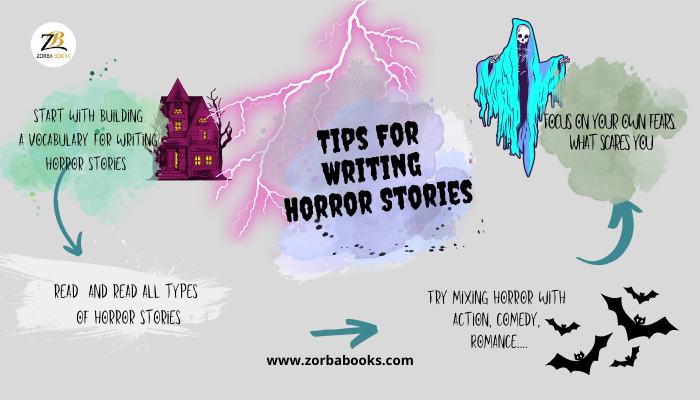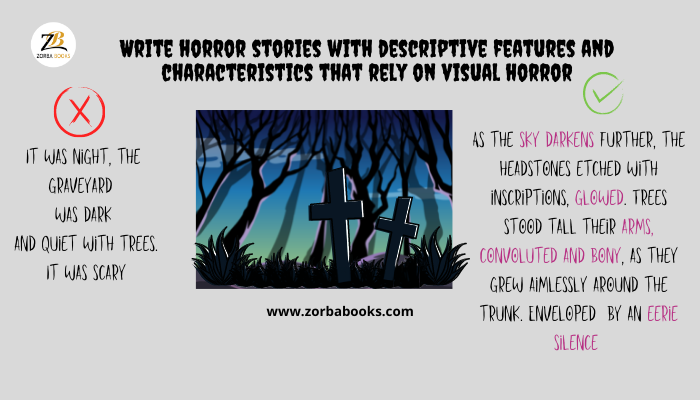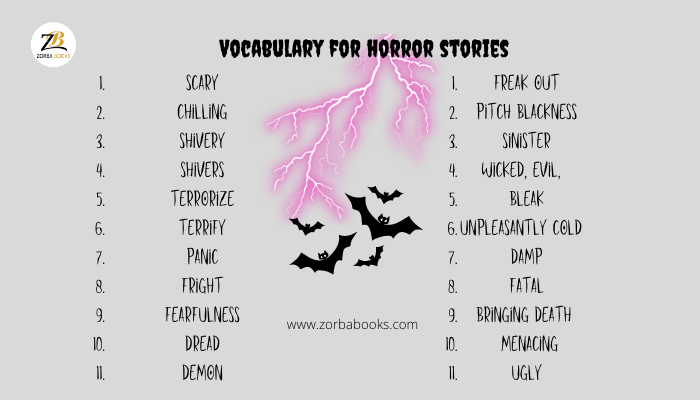
Which one would you choose?
Horror Writing
Or
Writing a Horror story
If the latter is your choice, then read on.
If you find books like ‘It’ by Stephen King, ‘The Exorcist’, ‘Ring’, and Lord of the Flies,’ irresistible, then writing horror stories is the genre for you. If you’re new to the genre or want to know how to write ghost stories, how to write scary stories, how to write short horror stories, how to write horror novels read the words on this page carefully. Keep scrolling to understand the world of horror and what it takes to write a good horror story.
Like any other genre, horror isn’t a monolith. That is, not all horror aims to make the reader scream aloud. Some are psychological, twisting and playing with their reader’s mind like a Rubik’s cube, while others offer a unique commentary on human behaviour. The Goosebumps series includes thriller, supernatural and horror elements. The Twilight series is not pure horror but weaves in romance, relationships and friendship elements. To master the art of horror story writing requires understanding the genre and the human psyche- what makes people shiver? You’ll find it’s not just the mere existence of demons and monsters.
It is no secret that many of us view reading as an escape from the monotony of everyday life. Horror does just that, a tad differently. Instead of butterflies, a good horror story makes our adrenalin soar as we hold our breath and break out into a sweat.

Horror Story Writing: What it Means for You
Before you start to write horror stories, before your very first draft, you must face the core question which is at the heart of any writing. What makes you want to write horror stories? It is a fascinating genre, but you must understand the factors driving you to write it. In an interview, Tim Waggoner said that he finds “horror to be a wonderful blank canvas because, in the shadows, you can imagine anything could be there.” But he isn’t just talking of the ghosts lurking around every corner.
Waggoner’s horror is a form of catharsis that maps out a person’s darkness held within them and then expresses it in writing. Stephen King, admitted that he wrote horror to “drown the scariness of his own mind.”
Your horror needs to be understood, first and foremost, by you before other people can experience the horror in your books. Ask yourself, what is it that scares you? You’ll realize it’s not just the monsters under your bed.
There are other reasons to write horror story: this genre holds a special place for you, you’ve grown up reading it and hence feel attached to it, or you’re just out exploring. Understanding your mind and its fears and phobias is a massive step to realizing what kind of horror you wish to write and what makes that kind best suited for you.
Elements and Vocabulary in writing a horror story
In horror stories writing, use words that build up an eerie setting. Your vocabulary for writing horror stories and phrases should fill your reader with dread and have them anticipate the next scene. The fundamental ingredient to a good horror story is good writing. Here are a few tips for you:
- Write horror stories with descriptive features and characteristics that rely on visual horror. Describe the texture of gooey skin and pointy teeth, missing nostrils and eyes hanging out from the socket like a pendulum from a wall clock. If your writing lacks description, the horror dies out. Read the following passage from Stephen King’s Survivor Type to get a better idea of descriptive writing:
“The mallet smashed into the bathroom door, knocking out a huge chunk of the thin paneling. Half of a crazed and working face stared in at her. The mouth and cheeks and throat were lathered in blood, the single eye she could see was tiny and piggish and glittering.”
Now look at the following excerpts from a non-horror piece of writing by Earnst Hemmingway . Do you see the difference?
“In the late summer of that year we lived in a house in a village that looked across the river and the plain to the mountains. In the bed of the river there were pebbles and boulders, dry and white in the sun, and the water was clear and swiftly moving and blue in the channels. Troops went by the house and down the road and the dust they raised powdered the leaves of the trees.”

- While writing a horror story, show fear instead of just telling your audience that your character is scared. Use words like ‘creepy,’ ‘dreary’ ‘frightened.’ But moreover, describe what fear looks like. Use the five senses of touch, sound, sight, smell and taste. Describe how the colour leaves your character’s face, how they turn white, and their throats clog up and their teeth grind. Heightened senses are a great way to showcase how your character instils fear in your readers. The following excerpt is from the story The Raft:
“The black, viscous substance ran up her arm like mud … and under it, Randy saw her skin dissolving. She opened her mouth and screamed. At the same moment she began to tilt outward. She waved her other hand blindly at Randy and he grabbed for it. Their fingers brushed. Her eyes met his, and she still looked hellishly like Sandy Duncan. Then she fell outward and splashed into the water. The black thing flowed over the spot where she had landed.”
Compare this description of horror with Sylvia Plath’s description of her despair. Although both these passages talk of fear, the way they approach it are so different and while the former works for horror given its direct description of actions the latter is more metaphorical. It is best to avoid metaphorical analogies of fear in horror writing.
“I saw myself sitting in the crotch of this fig tree, starving to death, just because I couldn’t make up my mind which of the figs I would choose. I wanted each and every one of them, but choosing one meant losing all the rest, and, as I sat there, unable to decide, the figs began to wrinkle and go black, and, one by one, they plopped to the ground at my feet.”
- Gore isn’t the only scary element out there. The impending sense of doom and dread could be equally scary, if not more. Write horror stories in which your characters have three-dimensional personalities and question their human morality. Presenting your readers with questionable, yet possible, human behaviour can give them a fright that remains with them for weeks to come. The following excerpt is from Messenger of Fear by Michael Grant:
“Cold fingers of horror squeezed my heart, wrung the blood from it and left me gasping for air. Each inhalation was a sniffle, each exhalation a shudder. My fingernails pressed into my palms and the pain of it was proof that I was alive, or something like alive, and yet I knew, I knew what I would see in that coffin.”
As you can see from the examples above, horror is a play of words and how you use and manipulate them. What meaning do you give to them and how do you use them in the more treacherous situations?
Tips For Writing Horror Stories
Vocabulary for writing horror stories and phrases are just a part of writing horror (although, admittedly, a very large part). But writing horror entails various other elements as well. Lastly, here are a few tips for writing horror stories for you that can help you dive right into the world of horror.
- Keep reading horror: The more you read, the better your grasp of the genre. Read Edgar Allen Poe or Stephen King and others and try to decipher what makes their writing one for the ages.
- Horror can transcend the boundaries of a genre. Try mixing horror with action, comedy, philosophy and even romance. Read the works of Neil Gaiman or Joyce Carol Oates to understand cross-horror writing better. It can give your story an extra dimension and more space for exploring human emotions and behaviour.
- Focus on your own fears. What scares you and what do you think will scare your audience? A large part of being a writer is authenticity. Observe the people around you and ask them a thought that often frightens them. It can be the impending death or the afterlife. Play with different settings. Your story can be gore-free and still be one of the scariest works to come in the last few years.

No one excels at writing in a single day, especially not something as intuitive as horror. To evoke fright from a stranger, is probably one of the hardest things to do. That too in words. No images, lightning and sound to assist you. Keep reading horror stories tips and putting them into your horror story writing. Make nights your own, look at people, and their darkness and start typing away.
Finally, writing a horror story is not only about horror but also about writing a story that holds the reader’s attention. Here are some references that will help you write even better horror stories.
How to Write a Bestselling Book?
Delight the Reader, write Dialogues Using These 11 Tips
Common Traps to Avoid While Writing a Book
Discover more from ZorbaBooks
Subscribe to get the latest posts sent to your email.